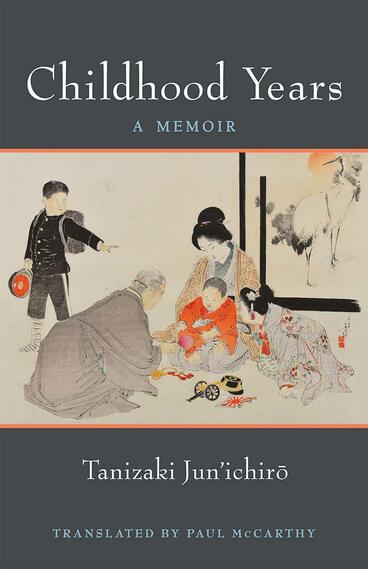Set against the modernization of Japan, this memoir offers a moving look at famed novelist Tanizaki' Jun'ichirō’s early years
Description
In Childhood Years, originally published serially in a literary magazine between 1955 and 1956, Tanizaki Jun’ichirō (1886–1965) takes a meandering look back on his early life in Tokyo. He reflects on his upbringing, family, and the capital city with a conversational—and not necessarily honest—eye, offering insights into his later life and his writing.
Paul McCarthy is Professor Emeritus of Comparative Culture at Surugadai University, Saitama, Japan. He has translated Tanizaki's “The Little Kingdom,” “Professor Radō,” and A Cat, a Man, and Two Women, which won the Japan-America Friendship Commission Prize. He co-translated with Anthony H. Chambers the story collections Red Roofs and Other Stories and The Gourmet Club, a Sextet, also by Tanizaki. He has translated short story collections by Nakajima Atsushi (The Moon over the Mountain, with Nobuko Ochner) and Kanai Mieko (The Word Book), 101 Modern Japanese Poems, and two volumes of Shiba Ryōtarō‘s Clouds above the Hill.
Reviews
“Unlike many of his contemporaries, Tanizaki was a consummate literary craftsman acutely concerned with form and structure and unity. This side of the writer is suppressed in Childhood Years, where the freedom of the zuihitsu genre sometimes becomes an excuse to ramble. Yet Tanizaki's reminiscences are imbued with the self-irony that enlivens the comedy in his fiction, and he often succeeds in evoking the textures of childhood experience to striking effect. The translation conveys the vitality of the original, using deft touches of interpolation and substitution where needed. Paul McCarthy has made available in English a memoir suffused with longing, which shows Tanizaki engaged in the act of remembrance that illuminated so much of his writing.”
— Ken Ito, University of Michigan
“Tanizaki found perhaps that childhood and old age had more in common with each other than either had with youth. Adolescents can be smutty and confused, whereas children and old men get really dirty and obsessed. At any rate, in 1956 Tanizaki wrote both Kagi, an intricate tale of an aging deviant, and Yōshō Jidai, a volume of memoirs rendered now in Paul McCarthy's precise, fluent translation as Childhood Years.”
— Paul Anderer, Columbia University
“The septuagenarian but lively Tanizaki, who died in 1965, threads the narrow streets of late 19th and early 20th century Tokyo. That city was to be lost forever in the great earthquake of 1923, but he recollects its byways with impressive clarity, down to the expert calligraphy on a road sign. Readers of Tanizaki’s fiction will recognize in this tour not only his acute sense of place but his gift for the essential, often unsavory detail.”
— Mary Jo Salter, The New York Times

